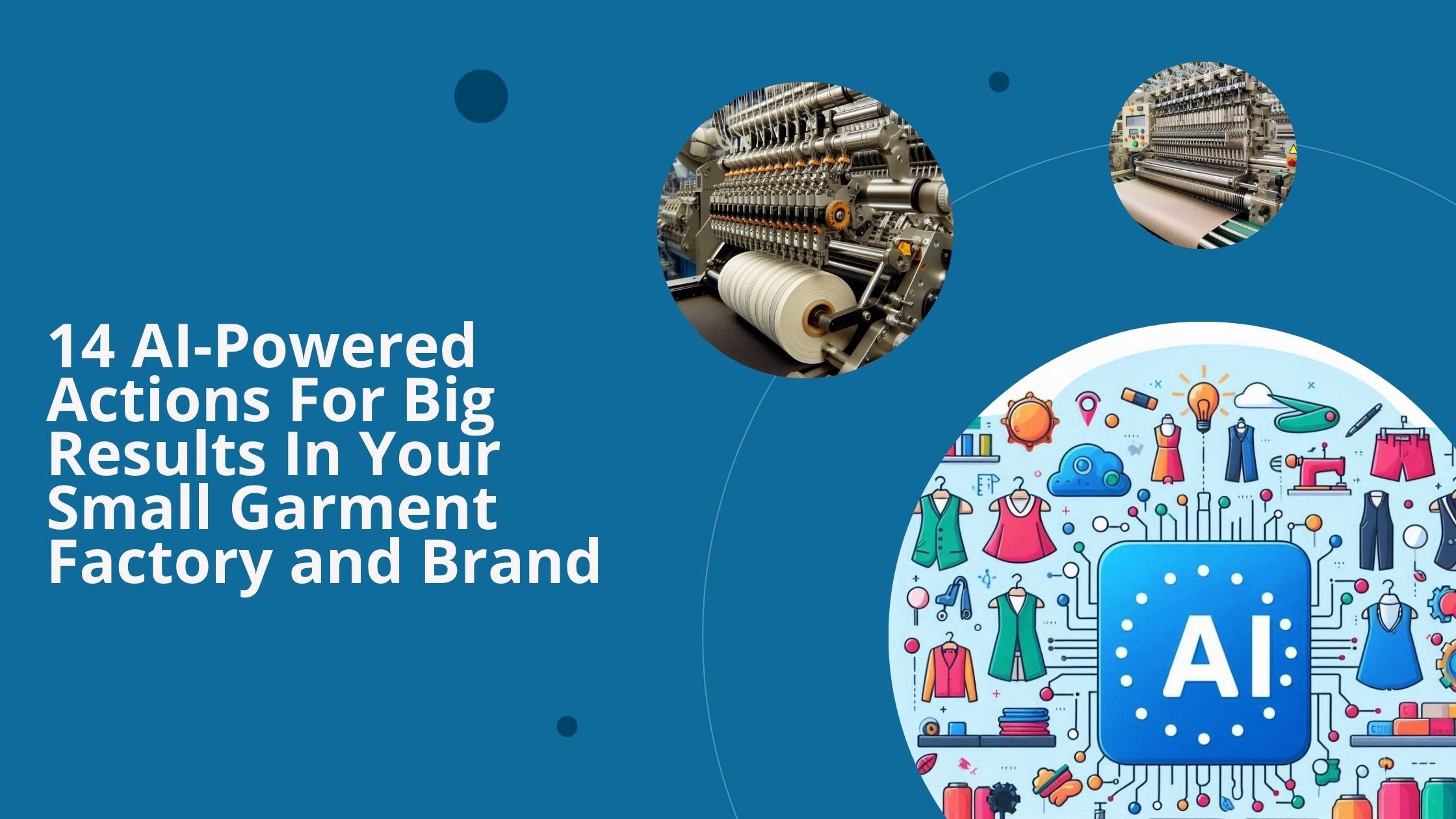14 AI-Powered Actions For Big Results In Your Small Garment Factory and Brand
| Oct, 12 , 24
Can your small garment factory or brand achieve massive results with the help of AI? AI is now accessible to businesses of all sizes. Today, even small garment factories and independent brands can leverage AI to optimize operations, improve customer engagement, and stay ahead in a highly competitive market. AI in the garment industry can streamline everything from design and production to marketing and supply chain management.
We will explore 14 AI-powered actions that can help small garment manufacturers and brands achieve significant results, driving efficiency, creativity, and profitability across their businesses. Whether you are starting or looking to scale, these AI strategies are essential for growth and success.
Let us start.
1. Optimize Inventory Management
- AI’s Role: AI-powered systems can monitor real-time inventory levels, predict demand patterns, and determine the optimal time for restocking based on historical sales data and market trends.
- Example: Small garment factories can use AI to minimize overproduction and reduce dead stock, leading to better cash flow management. AI-based inventory solutions can predict high-demand periods, ensuring the factory maintains enough stock to meet demand without overspending on excess materials.

2. Automate Quality Control
- AI’s Role: AI systems with machine vision and deep learning algorithms can automatically detect defects in fabric, sewing patterns, or production processes, ensuring consistent product quality.
- Example: A small garment factory can use AI to scan fabric during production to detect flaws like uneven stitching or pattern mismatches. It reduces manual inspections, speeds up production, and ensures that only high-quality garments reach customers.
3. Enhance Product Design with Generative AI
- AI’s Role: AI-assisted design platforms use algorithms to create and test new patterns, colors, and styles, allowing designers to explore multiple creative options quickly.
- Example: A small brand with generative AI tools can design unique and innovative garments. This technology allows for faster prototyping, as AI can quickly generate and refine designs that fit the vision, saving time and resources in the design process.
4. Predict Consumer Trends
- AI’s Role: AI analyzes large amounts of consumer data, including purchase histories, social media interactions, and industry trends, to forecast what will be popular in upcoming seasons.
- Example: Small garment brands can use AI to stay ahead of fashion trends, allowing them to design and produce collections that meet future customer demands. For instance, an AI-powered trend forecasting tool might predict an upcoming demand for eco-friendly fabrics, giving the brand time to adjust its sourcing and production plans.

5. Streamline Production Scheduling
- AI’s Role: AI-driven production scheduling tools can optimize machine usage, predict maintenance needs, and assign labor to avoid production delays and machine downtimes.
- Example: A small garment factory that adopts AI-based scheduling sees increased productivity as the AI tool predicts which machines will be free or require maintenance, ensuring a seamless flow in production and reducing downtime.
6. Improve Supply Chain Transparency
- AI’s Role: AI provides real-time visibility into performance and ethical practices, tracking factors like delivery timelines, labor conditions, and environmental impact.
- Example: Small brands can leverage AI to monitor their supply chain for compliance with ethical standards, such as ensuring no child labor is used and reducing carbon emissions. AI platforms provide detailed insights into supplier practices, helping brands maintain transparency and trust.
7. Personalize Marketing Campaigns
- AI’s Role: AI-driven marketing tools can segment customer data based on shopping habits, preferences, and behavior, allowing brands to create highly targeted and personalized marketing strategies.
- Example: A small garment brand uses AI to tailor marketing emails or ads for different customer segments. By offering personalized recommendations and discounts based on past purchases, brands can increase customer engagement and sales conversion rates.

8. Automate Customer Service with AI
- AI’s Role: AI chatbots can handle customer service queries 24/7, answering questions about product availability, shipping times, or returns policies.
- Example: A small garment brand can implement AI chatbots on its website for instant customer inquiries, improving customer satisfaction by offering quick, automated support outside business hours.
9. Drive Sales with AI-Enhanced E-commerce
- AI’s Role: AI tools optimize product recommendations on e-commerce platforms, improving the user experience by showcasing products customers are more likely to buy based on browsing history and preferences.
- Example: An AI-driven recommendation engine on a small garment online store increases conversion rates by suggesting relevant products to customers, which leads to more purchases and a higher average order value.
10. Improve Sustainability Efforts
- AI’s Role: AI-powered tools can monitor and report on the environmental impact, including resource usage and carbon emissions, helping brands become more eco-friendly.
- Example: A small brand can use AI to analyze and track its carbon footprint across the supply chain, helping it meet sustainability goals by identifying areas for improvement, such as reducing waste or switching to sustainable materials.
11. Boost Financial Performance with Predictive Analytics
- AI’s Role: AI financial tools use predictive analytics to forecast cash flow, manage budgets, and predict future financial performance based on sales trends and market conditions.
- Example: A small garment factory that uses AI-based financial forecasting tools can better manage cash flow, avoid unexpected shortfalls, and plan for future investments by identifying peak sales periods or potential risks.

12. Monitor Brand Reputation with AI
- AI’s Role: AI social listening tools scan online platforms for mentions of the brand, customer reviews, and public sentiment, providing real-time insights into how the brand is perceived.
- Example: A small garment brand can use AI to track customer feedback on social media and review sites, quickly identifying quality concerns or delivery delays. It allows the brand to respond proactively and protect its reputation.
13. Enhance Employee Productivity
- AI’s Role: AI-driven task management tools can automate routine tasks and assign work efficiently based on skillsets and workload, improving overall productivity.
- Example: A small garment factory with AI-powered scheduling tools can automate repetitive tasks like order tracking and employee scheduling. It frees employees to focus on more complex tasks, like design or customer relations.
14. Ensure Cybersecurity and Data Protection
- AI’s Role: AI tools can detect cybersecurity threats such as data breaches or hacking attempts and help ensure compliance with data protection laws like GDPR.
- Example: A small garment brand can implement AI cybersecurity systems that monitor unusual activity and provide real-time alerts, ensuring sensitive customer data remains secure and reducing the risk of data breaches.

Grow Your Brand With EverLighten
In our fast-paced garment industry, embracing AI-driven solutions can help small garment factories and brands unlock massive results. From optimizing inventory and streamlining production to personalizing customer experiences, AI offers a range of opportunities to improve efficiency, boost sales, and maintain a competitive edge.
At EverLighten, we are committed to supporting small garment brands on their journey toward success. Whether you need expert guidance in design, production, or logistics, our dedicated team is here to help.
When you work with us, you get:
- 100% customization to meet your unique needs.
- 100% quality check at every stage to ensure perfection.
- Our free design service turns your vision into reality.
- Worldwide delivery, so your products reach global customers.
- 24/7 support to assist you at any time.
- Unlimited revisions until you are 100% satisfied.
- Low MOQ (Minimum Order Quantity) to help you start small and grow confidently.
Ready to scale your garment business with EverLighten? Contact us today to discuss how we can support your journey to success.
FAQs
What is the minimum order quantity (MOQ) for custom garments at EverLighten?
EverLighten offers a low MOQ, allowing small garment brands and startups to begin with smaller production runs before scaling up.
How do I ensure the quality of the products when working with EverLighten?
We implement a 100% quality check at every stage to ensure the final product meets your expectations.
Can EverLighten help with the design process?
Absolutely! We provide free design assistance, offering professional guidance to bring your vision to life.
Does EverLighten deliver internationally?
Yes, we offer worldwide delivery to ensure your products can reach customers across the globe.
What if I need changes to my design after the initial submission?
We offer unlimited revisions until you are 100% satisfied with the final product, ensuring it meets your needs.

